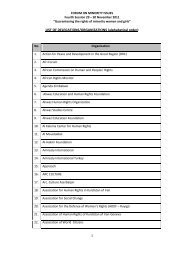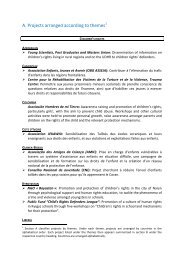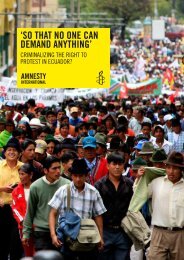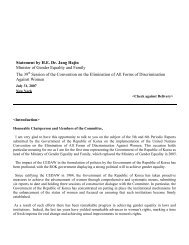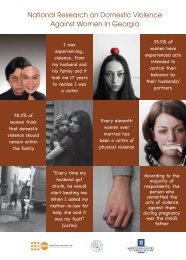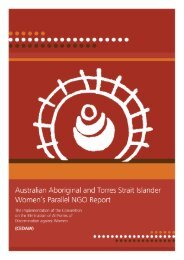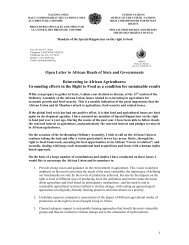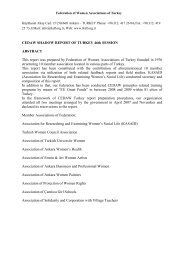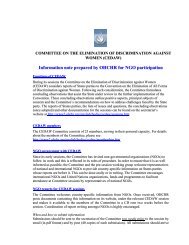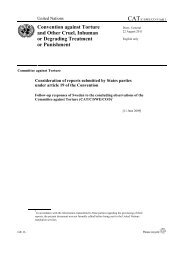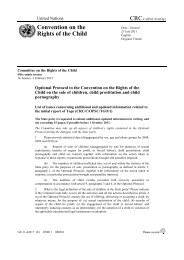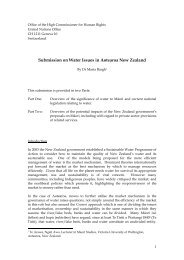Report - Office of the High Commissioner on Human Rights
Report - Office of the High Commissioner on Human Rights
Report - Office of the High Commissioner on Human Rights
- No tags were found...
You also want an ePaper? Increase the reach of your titles
YUMPU automatically turns print PDFs into web optimized ePapers that Google loves.
Case study<br />
In <str<strong>on</strong>g>the</str<strong>on</strong>g> Obed Toto Case (Vanuatu, has ratified CEDAW and CRC), women claimed a share<br />
<str<strong>on</strong>g>of</str<strong>on</strong>g> lease m<strong>on</strong>ey from <str<strong>on</strong>g>the</str<strong>on</strong>g> lease <str<strong>on</strong>g>of</str<strong>on</strong>g> “Champagne Beach”, to cruise liners. Traditi<strong>on</strong>/custom<br />
does not allow women (including mo<str<strong>on</strong>g>the</str<strong>on</strong>g>rs, sisters, aunts, daughter etc.) to claim a share<br />
<str<strong>on</strong>g>of</str<strong>on</strong>g> lease m<strong>on</strong>ey. Only males in <str<strong>on</strong>g>the</str<strong>on</strong>g> family can receive shares <str<strong>on</strong>g>of</str<strong>on</strong>g> lease m<strong>on</strong>ey. Women<br />
argued that this principle violated Article 5 <str<strong>on</strong>g>of</str<strong>on</strong>g> CEDAW and was unc<strong>on</strong>stituti<strong>on</strong>al. The Court<br />
in Vanuatu held that women should be allowed to receive lease m<strong>on</strong>ey and that <str<strong>on</strong>g>the</str<strong>on</strong>g><br />
customary practice did violate CEDAW and <str<strong>on</strong>g>the</str<strong>on</strong>g> Vanuatu C<strong>on</strong>stituti<strong>on</strong>.<br />
In places like T<strong>on</strong>ga, however, discriminati<strong>on</strong> seems to be entrenched in <str<strong>on</strong>g>the</str<strong>on</strong>g> c<strong>on</strong>stituti<strong>on</strong>. The<br />
c<strong>on</strong>stituti<strong>on</strong> cannot be changed until <str<strong>on</strong>g>the</str<strong>on</strong>g> structure <str<strong>on</strong>g>of</str<strong>on</strong>g> parliament is changed, so women’s participati<strong>on</strong><br />
in democracy is also an important area to focus <strong>on</strong>.<br />
Many women in <str<strong>on</strong>g>the</str<strong>on</strong>g> Pacific cannot access credit and cannot claim <str<strong>on</strong>g>the</str<strong>on</strong>g>ir inheritance rights. They also<br />
do not have <str<strong>on</strong>g>the</str<strong>on</strong>g> necessary collateral for accessing credit. For example, in T<strong>on</strong>ga, <str<strong>on</strong>g>the</str<strong>on</strong>g> T<strong>on</strong>ga C<strong>on</strong>stituti<strong>on</strong><br />
and Land Act (Secti<strong>on</strong> 111) excludes women from inheriting land. Widows can <strong>on</strong>ly inherit land if<br />
<str<strong>on</strong>g>the</str<strong>on</strong>g>y are not sexually active. Therefore credit schemes, which require women to show <str<strong>on</strong>g>the</str<strong>on</strong>g>y are married,<br />
in order to access loans for housing, directly discriminate against single mo<str<strong>on</strong>g>the</str<strong>on</strong>g>rs and female-headed<br />
households. Al<strong>on</strong>g similar lines, an NGO in Fiji called HART discriminates against unmarried women<br />
by providing housing assistance <strong>on</strong>ly to married women.<br />
The key obstacles women face in realising <str<strong>on</strong>g>the</str<strong>on</strong>g>ir rights to housing, land, inheritance and property include:<br />
• Discriminatory policies in lending and financial instituti<strong>on</strong>s – women who do not own land cannot<br />
get loans;<br />
• Lack <str<strong>on</strong>g>of</str<strong>on</strong>g> informati<strong>on</strong> am<strong>on</strong>g women <strong>on</strong> women’s rights - women cannot claim <str<strong>on</strong>g>the</str<strong>on</strong>g>ir rights without<br />
knowing <str<strong>on</strong>g>the</str<strong>on</strong>g>ir rights;<br />
• Traditi<strong>on</strong>al land ownership systems (both matrilineal and patrilineal) that favour men – where<br />
men negotiate <strong>on</strong> behalf <str<strong>on</strong>g>of</str<strong>on</strong>g> men and women, <str<strong>on</strong>g>the</str<strong>on</strong>g>y promote <str<strong>on</strong>g>the</str<strong>on</strong>g>ir own interests ra<str<strong>on</strong>g>the</str<strong>on</strong>g>r than <str<strong>on</strong>g>the</str<strong>on</strong>g> interests<br />
<str<strong>on</strong>g>of</str<strong>on</strong>g> women;<br />
• Negative gender stereotypes based <strong>on</strong> traditi<strong>on</strong> and customary practices — for example, initiati<strong>on</strong><br />
processes for young men may involve having sex with women;<br />
• Traditi<strong>on</strong>al hierarchical systems <str<strong>on</strong>g>of</str<strong>on</strong>g> governance that discriminate against women;<br />
• Religious practices that promote negative stereotypes <str<strong>on</strong>g>of</str<strong>on</strong>g> women;<br />
• D<strong>on</strong>ors (including UNDP) that observe traditi<strong>on</strong>al discriminatory systems. For example, UNDP<br />
undertaking training with local courts <str<strong>on</strong>g>of</str<strong>on</strong>g> justice in <str<strong>on</strong>g>the</str<strong>on</strong>g> Solom<strong>on</strong> Islands, is providing training to<br />
all men, and in deference to <str<strong>on</strong>g>the</str<strong>on</strong>g>ir culture, reinforces <str<strong>on</strong>g>the</str<strong>on</strong>g> gender discriminatory traditi<strong>on</strong>s in <str<strong>on</strong>g>the</str<strong>on</strong>g><br />
training.<br />
Recommendati<strong>on</strong>s to States:<br />
– Include women in land committees and all o<str<strong>on</strong>g>the</str<strong>on</strong>g>r decisi<strong>on</strong>-making committees in <str<strong>on</strong>g>the</str<strong>on</strong>g> community;<br />
– Select women judges at all levels;<br />
– Provide human rights training for <str<strong>on</strong>g>the</str<strong>on</strong>g> police, judiciary, legislators, government <str<strong>on</strong>g>of</str<strong>on</strong>g>ficials,<br />
religious leaders and women.<br />
46 WOMEN’S RIGHTS TO ADEQUATE HOUSEING AND LAND



